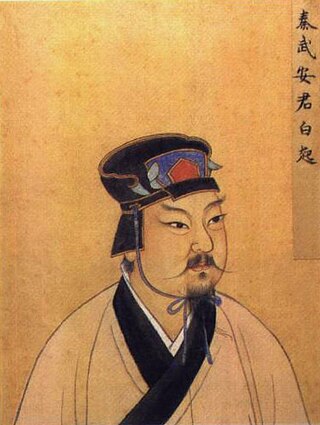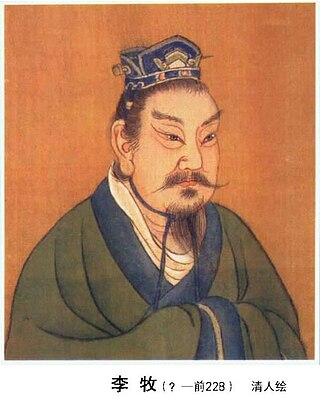This article concerns the period 279 BC – 270 BC.
This article concerns the period 269 BC – 260 BC.
Year 260 BC was a year of the pre-Julian Roman calendar. At the time it was known as the Year of the Consulship of Asina and Duilius. The denomination 260 BC for this year has been used since the early medieval period, when the Anno Domini calendar era became the prevalent method in Europe for naming years.

The Warring States period was an era in ancient Chinese history characterized by warfare, bureaucratic and military reform, and political consolidation. It followed the Spring and Autumn period and concluded with the wars of conquest that saw the state of Qin annex all the other contender states by 221 BC and found the Qin dynasty, the first imperial dynasty in Chinese history.

The Battle of Changping (長平之戰) was a military campaign during the Warring States period of ancient China, which took place from 262 BC to 260 BC at Changping, between the two strongest military powers, the State of Qin and the State of Zhao. After a bitter two-year stalemate, the battle ended in a decisive victory for Qin forces and the ruthless execution of most of the Zhao captives, resulting in an unrecoverable loss of manpower and strategic reserve for the Zhao state.

Zhao was one of the seven major states during the Warring States period of ancient China. It emerged from the tripartite division of Jin, along with Han and Wei, in the 5th century BC. Zhao gained considerable strength from the military reforms initiated during the reign of King Wuling, but suffered a crushing defeat at the hands of Qin at the Battle of Changping. Its territory included areas in the modern provinces of Inner Mongolia, Hebei, Shanxi and Shaanxi. It bordered the states of Qin, Wei, and Yan, as well as various nomadic peoples including the Hu and Xiongnu. Its capital was Handan, in modern Hebei province.

Bai Qi, also known as Gongsun Qi (公孫起), was a Chinese military general of the Qin state during the Warring States period. Born in Mei, Bai Qi served as the commander of the Qin army for more than 30 years, being responsible for the deaths of over one million, earning him the nickname Ren Tu. According to the Shiji, he seized more than 73 cities from the other six hostile states, and to date no record has been found to show that he suffered a single defeat throughout his military career. He is regarded by Chinese folklore as one of the four Greatest Generals of the Late Warring States period, along with Li Mu, Wang Jian, and Lian Po; he is also remembered as the most fearsome amongst the four.

Lian Po, was a prominent General of the Zhao state in the Warring States period of Chinese history. He is regarded by Chinese modern folklore as one of the Four Greatest Generals of the Late Warring States period, along with Bai Qi, Wang Jian and Li Mu. Since his early years as a general, he won multiple battles, which earn him fame and a successful military career in his home state.
Lin Xiangru was a politician and general of the Warring States period, who served the state of Zhao. He figures prominently in two stories of the period, namely the episode and the namesake chengyu of "Returning the Jade to Zhao", as well as the story and the namesake chengyu of "Carrying Thorned Grass and Pleading Guilt".
Zhao She was a Chinese bureaucrat and general for the State of Zhao during the Warring States period.

Wang Jian was a distinguished Chinese military General from the State of Qin during the Warring States period. Under his command, the Qin army conquered the states of Zhao, Yan, and Chu. He is regarded by Chinese modern folklore as one of the four Greatest Generals of the Late Warring States period, along with Bai Qi, Lian Po and Li Mu.

King Zhaoxiang of Qin, or King Zhao of Qin (秦昭王), born Ying Ji (Chinese: 嬴稷, was the king of Qin from 306 BC to 251 BC. He was the son of King Huiwen and younger brother of King Wu.

Li Mu, personal name Zuo (繓), courtesy name Mu (牧), was a Chinese military General of the State of Zhao during the Warring States period. He is regarded by Chinese folklore as one of the four Greatest Generals of the Late Warring States period, along with Bai Qi, Wang Jian, and Lian Po. He is widely considered as one of the best defensive tacticians commanders of ancient warfare.

Qin's wars of unification were a series of military campaigns launched in the late 3rd century BC by the state of Qin against the other six powers remaining in China — Han, Zhao, Yan, Wei, Chu and Qi. Between 247 and 221 BC, Qin had developed into one of the most powerful of China's Seven Warring States that coalesced in the wake of the Zhou dynasty's decline, by now retaining a weak and merely ceremonial position among the warring states. In 230 BC, King Ying Zheng of Qin began the sequence of campaigns that would bring the Warring States period to a close, setting out to conquer each remaining sovereign one by one. This was completed in 221 BC with the fall of Qi, leaving the former Zhou sphere unified under a more centralized Qin control. Ying Zheng declared himself the First Emperor, or Qin Shi Huang—becoming the first sovereign over a unified China under the imperial Qin dynasty,.
King Huanhui of Han, ancestral name Jì (姬), clan name Hán (韩), personal name unknown, was the ruler of the State of Han between 272 BC and until his death in 239 BC. He was the son of King Xi of Han. During his reign, Han Fei submitted numerous proposals to enact Legalism. In 246 BC, King Huanhui sent Zheng Guo west to Qin to construct a canal with the intention of wasting Qin's resources. The canal came to be known as Zhengguo Canal.

Changping of the War, also known as The Battle of Changping, is a Chinese television series based on the events surrounding the Battle of Changping, fought between the states of Qin and Zhao during the Warring States period. The series was produced in 2004 but has yet to be aired on television stations in China.
Tian Jian,Houzhu of Tian Qi was the last king of Qi, one of the seven major states of the Warring States period of ancient China. His personal name was Tian Jian (田建), ancestral name Gui, and he did not have a posthumous title because he was the last king of Qi however he was known as Houzhu of Qi because he was the last ruler of Qi.

King Xiaocheng of Zhao was a king of the State of Zhao during the Warring States period of ancient China. His reign saw the decline of Zhao military power owing to the catastrophic defeat by the State of Qin at the Battle of Changping.

The Qin Empire III is a 2017 Chinese television series based on Sun Haohui's novel of the same Chinese title, which romanticizes the events in China during the Warring States period primarily from the perspective of the Qin state under King Zhaoxiang. It was first aired on CCTV-1 in mainland China in 2017. It was preceded by The Qin Empire (2009) and The Qin Empire II: Alliance (2012) and followed by The Qin Empire IV (2019), which were also based on Sun Haohui's novels.

The military of the Warring States refers primarily to the military apparatuses of the Seven Warring States which fought from around 475 BC to 221 BC when the state of Qin conquered the other six states, forming China's first imperial dynasty, the Qin dynasty.












